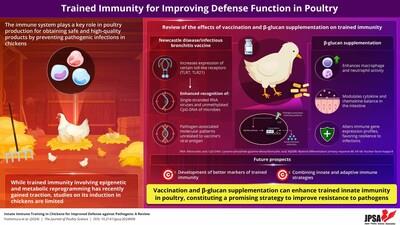New Research In The Journal Of Poultry Science: Trained Immunity Offers Novel Poultry Disease Prevention Strategies
The adaptive immune system, which includes highly specific responses driven by cellular memory, has long been the focus of vaccination strategies. However, recent research has highlighted the potential of trained immunity as a promising approach to disease prevention in various animals. Trained immunity can enhance the innate immune system-a less specific line of defense-through epigenetic and metabolic reprogramming of immune cells. However, the concept of trained immunity in poultry remains underexplored.
Against this backdrop, a research team led by Professor Yukinori Yoshimura from Hiroshima University and The Open University of Japan recently published a review article in The Journal of Poultry Science in Volume 61 on March 13, 2024. This review highlights the effects of vaccination and β-glucan supplementation on trained immunity in chickens.
"One of the key findings of our review was that the Newcastle disease/infectious bronchitis vaccine, widely used in poultry farming, has been shown to increase the expression of certain toll-like receptors (TLR7 and TLR21)," says Prof. Yoshimura. These receptors enable innate immune cells to detect single-stranded ribonucleic acid viruses and unmethylated cytosine-phosphate-guanine-deoxyribonucleic acid of pathogens, even those unrelated to the vaccine's specific antigens. Therefore, vaccination may enhance the innate immune system's responses alongside its well-established effects on adaptive immunity, constituting a form of trained immunity.
Notably, the benefits of β-glucan supplementation are quite varied, as it enhances the activity of innate immune cells and modulates the balance of cytokines and chemokines in the intestine, supporting a healthier immune environment.
However, further research is needed to fully understand the applicability of vaccines and dietary supplementation in achieving trained immunity. "The determination of markers of trained immunity, such as specific histone modifications and intracellular metabolic events, will support the exploration of more effective vaccines and feed additives in the future," says Prof. Yoshimura, "Nonetheless, the enhancement of both adaptive and innate immunity will likely provide chickens with better defense mechanisms, leading to healthier and more productive poultry."
Reference
Title of original paper: Innate Immune Training in Chickens for Improved Defense against Pathogens: A Review
Journal: The Journal of Poultry Science
DOI: 10.2141/jpsa.2024008
About Hiroshima University
Website:
Media Contact:
Kazuhisa Honda
+81-29-838-8777
[email protected]
SOURCE The Journal of Poultry Science

Legal Disclaimer:
MENAFN provides the
information “as is” without warranty of any kind. We do not accept
any responsibility or liability for the accuracy, content, images,
videos, licenses, completeness, legality, or reliability of the information
contained in this article. If you have any complaints or copyright
issues related to this article, kindly contact the provider above.
Most popular stories
Market Research

- Poppy Seed Market Size, Share, In-Depth Insights, Opportunity And Forecast 2025-2033
- Primexbt Wins Global Forex Award For Best Multi-Asset Trading Platform
- Digital Gold ($GOLD) Officially Launches On Solana, Hits $1.8M Market Cap On Day One
- VCUK Launches New Private Equity And Venture Capital Initiative With A Focus On Europe
- With Seal, Walrus Becomes The First Decentralized Data Platform With Access Controls
- Primexbt Launches Empowering Traders To Succeed Campaign, Leading A New Era Of Trading






















Comments
No comment